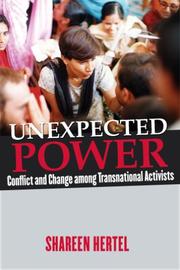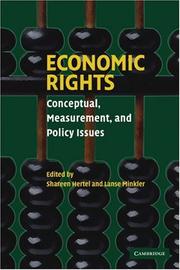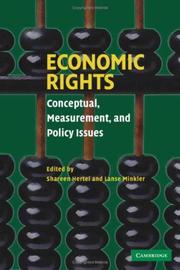| Listing 1 - 9 of 9 |
Sort by
|
Book
ISBN: 0190050551 0190903856 0190903864 Year: 2019 Publisher: New York, NY : Oxford University Press,
Abstract | Keywords | Export | Availability | Bookmark
 Loading...
Loading...Choose an application
- Reference Manager
- EndNote
- RefWorks (Direct export to RefWorks)
'Tethered Fates' explores the challenge of safeguarding economic rights beyond the factory floor in global supply chains. Drawing on a 7000-company database, it maps trends in company-community interaction through 'stakeholder dialogue.' It features grassroots perspectives from two manufacturing communities in the Dominican Republic, and assesses emerging policy alternatives globally.
Business logistics --- Industries --- Management. --- Social aspects. --- Business --- Business and social problems --- Business enterprises --- Industrial sociology --- Social responsibility of business --- Supply chain management --- Industrial management --- Logistics --- Social aspects

ISBN: 150172729X 9781501727290 9780801445071 0801445078 9780801473241 0801473241 Year: 2018 Publisher: Ithaca, NY : Cornell University Press,
Abstract | Keywords | Export | Availability | Bookmark
 Loading...
Loading...Choose an application
- Reference Manager
- EndNote
- RefWorks (Direct export to RefWorks)
U.S. human rights advocacy has long focused on civil and political rights-issues such as torture, censorship, and lack of democratic freedoms abroad. In the 1990s a series of high-profile anti-sweatshop and fair-trade campaigns shifted the spotlight to labor issues. But as human rights activists in the United States and elsewhere take up the cause of economic exploitation, they don't always agree on the nature of the problem, or on what should be done to address it. What is more, they do not necessarily have the final say: in many cases, the focus of a campaign will shift when local activists make their voices heard or when the imported aims of nongovernmental organizations conflict with the goals of the people they intend to help.Shareen Hertel explores the dramatic negotiations within cross-border human rights campaigns. Activists on the receiving end of such campaigns do much more than seek the help of powerful allies beyond their borders. They often also challenge outsiders' understandings of basic human rights-in some cases, directly (by "blocking" campaigns intended to help them) and in other cases, indirectly (by employing "backdoor moves" aimed at more subtly introducing new human rights norms). Hertel looks closely at struggles for human rights in two contexts: Bangladesh, where activists challenged the understanding of human rights central to an international campaign to prevent child labor in that country, and Mexico, where activists sought to broaden the scope of efforts to prevent discrimination against pregnant workers in their country. Hertel connects these unexpected challenges to a new wave of international advocacy, and thereby illuminates democratic struggles in the new global economy.
Pressure groups --- Human rights --- Human rights advocacy --- Advocacy groups --- Interest groups --- Political interest groups --- Special interest groups (Pressure groups) --- Functional representation --- Political science --- Representative government and representation --- Lobbying --- Policy networks --- Political action committees --- Social control --- Basic rights --- Civil rights (International law) --- Rights, Human --- Rights of man --- Human security --- Transitional justice --- Truth commissions --- Advocacy, Human rights --- Social advocacy --- National human rights institutions --- Societies, etc. --- Law and legislation
Book
Year: 1998 Publisher: New York (N.Y.) : Council on economic priorities,
Abstract | Keywords | Export | Availability | Bookmark
 Loading...
Loading...Choose an application
- Reference Manager
- EndNote
- RefWorks (Direct export to RefWorks)

ISBN: 9781501727290 150172729X 9780801445071 0801445078 9780801473241 0801473241 Year: 2006 Publisher: Ithaca, N.Y.
Abstract | Keywords | Export | Availability | Bookmark
 Loading...
Loading...Choose an application
- Reference Manager
- EndNote
- RefWorks (Direct export to RefWorks)

ISBN: 9780521690829 9780521870559 9780511511257 052169082X Year: 2007 Publisher: Cambridge: Cambridge university press,
Abstract | Keywords | Export | Availability | Bookmark
 Loading...
Loading...Choose an application
- Reference Manager
- EndNote
- RefWorks (Direct export to RefWorks)
This book assesses economic rights: defined as the right to a decent standard of living, the right to work, and the right to basic income support for people who cannot work. It explains how economic rights evolved historically, how they are measured, and how they can be implemented internationally. The book includes chapters by leading scholars in economics, law, and political science. Unlike many other books on the subject, this one includes a substantial introduction and is tightly organized around three themes: concepts, measurement, and policy implementation of economic rights.
Human rights --- Economic law --- Distributive justice. --- Human rights. --- Basic needs. --- Economic policy. --- Social policy. --- National planning --- State planning --- Economic policy --- Family policy --- Social history --- Economic nationalism --- Economic planning --- Economics --- Planning --- National security --- Social policy --- Necessities of life --- Needs, Basic --- Poverty --- Quality of life --- Social rights --- Basic rights --- Civil rights (International law) --- Rights, Human --- Rights of man --- Human security --- Transitional justice --- Truth commissions --- Distribution (Economic theory) --- Justice --- Social justice --- Wealth --- Law and legislation --- Moral and ethical aspects --- Basic needs --- Distributive justice --- Social ecology --- Economic rights

ISBN: 1107180015 1281040533 9786611040536 113913261X 0511334893 051133429X 0511333617 0511511256 0511335474 9781281040534 9780511333613 9780521870559 0521870550 9780521690829 052169082X 9780511335471 Year: 2007 Publisher: New York Cambridge University Press
Abstract | Keywords | Export | Availability | Bookmark
 Loading...
Loading...Choose an application
- Reference Manager
- EndNote
- RefWorks (Direct export to RefWorks)
This edited volume offers scholarship on economic rights by leading scholars in the fields of economics, law, and political science. It analyzes the central features of economic rights: their conceptual, measurement, and policy dimensions. In its introduction, the book provides a conceptualization of economic rights based on a three-pronged definition: the right to a decent standard of living, the right to work, and the right to basic income support for people who cannot work. Subsequent chapters correct existing conceptual mistakes in the literature, provide new measurement techniques with country rankings, and analyze policy implementation at the international, regional, national, and local levels. While it forms a cohesive whole, the book is nevertheless rich in contending perspectives.
Distributive justice. --- Human rights. --- Basic needs. --- Economic policy. --- Social policy. --- National planning --- State planning --- Economic policy --- Family policy --- Social history --- Economic nationalism --- Economic planning --- Economics --- Planning --- National security --- Social policy --- Necessities of life --- Needs, Basic --- Social ecology --- Economic rights --- Poverty --- Quality of life --- Social rights --- Basic rights --- Civil rights (International law) --- Human rights --- Rights, Human --- Rights of man --- Human security --- Transitional justice --- Truth commissions --- Distribution (Economic theory) --- Justice --- Social justice --- Wealth --- Law and legislation --- Moral and ethical aspects --- Law --- General and Others
Book
ISBN: 1139064118 1107221994 1283111195 1139076620 9786613111197 0511842260 1139083449 1139078909 1139081179 1139070908 9781139078900 9780511842269 9781107008465 1107008468 9781107400870 1107400872 9781139064118 9781107221994 9781283111195 9781139076623 6613111198 9781139083447 9781139081177 9781139070904 Year: 2011 Publisher: Cambridge New York Cambridge University Press
Abstract | Keywords | Export | Availability | Bookmark
 Loading...
Loading...Choose an application
- Reference Manager
- EndNote
- RefWorks (Direct export to RefWorks)
This book brings to light emerging evidence of a shift toward a fuller engagement with international human rights norms and their application to domestic policy dilemmas in the United States. The volume offers a rich history, spanning close to three centuries, of the marginalization of human rights discourse in the United States. Contributors analyze cases of US human rights advocacy aimed at addressing persistent inequalities within the United States itself, including advocacy on the rights of persons with disabilities; indigenous peoples; lone mother-headed families; incarcerated persons; lesbian, gay, bisexual and transgendered people; and those displaced by natural disasters. It also explores key arenas in which legal scholars, policy practitioners and grassroots activists are challenging multiple divides between 'public' and 'private' spheres (for example, in connection with children's rights and domestic violence) and between 'public' and 'private' sectors (specifically, in relation to healthcare and business and human rights).
Human rights --- Law --- General and Others
Book

ISBN: 9780812205145 Year: 2011 Publisher: Philadelphia
Abstract | Keywords | Export | Availability | Bookmark
 Loading...
Loading...Choose an application
- Reference Manager
- EndNote
- RefWorks (Direct export to RefWorks)
Multi

ISBN: 9780812205145 9780812243604 Year: 2011 Publisher: Philadelphia, Pa University of Pennsylvania Press
Abstract | Keywords | Export | Availability | Bookmark
 Loading...
Loading...Choose an application
- Reference Manager
- EndNote
- RefWorks (Direct export to RefWorks)
| Listing 1 - 9 of 9 |
Sort by
|

 Search
Search Feedback
Feedback About UniCat
About UniCat  Help
Help News
News